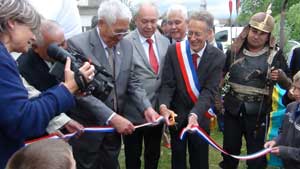
In the French city of Shepp was opened the monument of Attila, Hun empire’s ruller . Historians of our university attended this ceremony.
History of Huns is part of Turkic history, and therefore the history of Kazakhstan. At the same time it represents a part of the Eurasian and world history. It is no coincidence today Hun heritage is of great importance. This was mentioned by regional president of the Association of Historians of France Sylvia Dyutua and governor of the Shepp city Marcel Bonne during the inauguration of the monument to the legendary commander and ruler Attila.
 |
 |
Recall. It was here in the year 451 during the famous battle on the field stood Catalonian camp of Attila. This battle is one of the largest battles, along with Cannes days of Hannibal (216 BC), and Waterloo in Napoleon (1815). Attila's army, came out against the Roman Empire and its allies, to succeed, and then the Huns attacked the heart of the Roman Empire - Italy.
On its territory and influence Attila Empire geographically extended to all four corners of the world (ancient Turkic - tört bulun, Kazakh - "dүnienің tөrt bұryshy"). Hun limits run from east to west - from Altai, Central Asia and the Caucasus to the Danube and the Rhine. On the northern border of the kingdom, it stretched from the Huns to Germany. In the south, both paid tribute to Attila Roman Empire (Eastern Roman and the Western Roman). Hun Union in Central Asia helped to shape later Kazakh nation and other Turkic peoples.
Many European nations have considered Hun’s state as opposed to the Roman Empire, saw it as savior of Roman expansion.
Attila's time has left an indelible mark in the history of Eurasia, which has been preserved in historical works, chronicles and epic creations. Reading and analyzing historical evidence rare in Latin, early German and Scandinavian languages, I was able to establish that, at least in the 18-heroic epic works of German and Scandinavian sagas reflect the great deeds of the Huns and their emperor (in which he called Attila, Etzel, Atzel, Atli).
In addition to wars and migrations in the transition period from antiquity to the Middle Ages can be seen and multifaceted interaction between East and West, the synthesis, the penetration of traditions and cultures, had a great influence on the formation of a qualitatively new civilization and socio-cultural relations.


